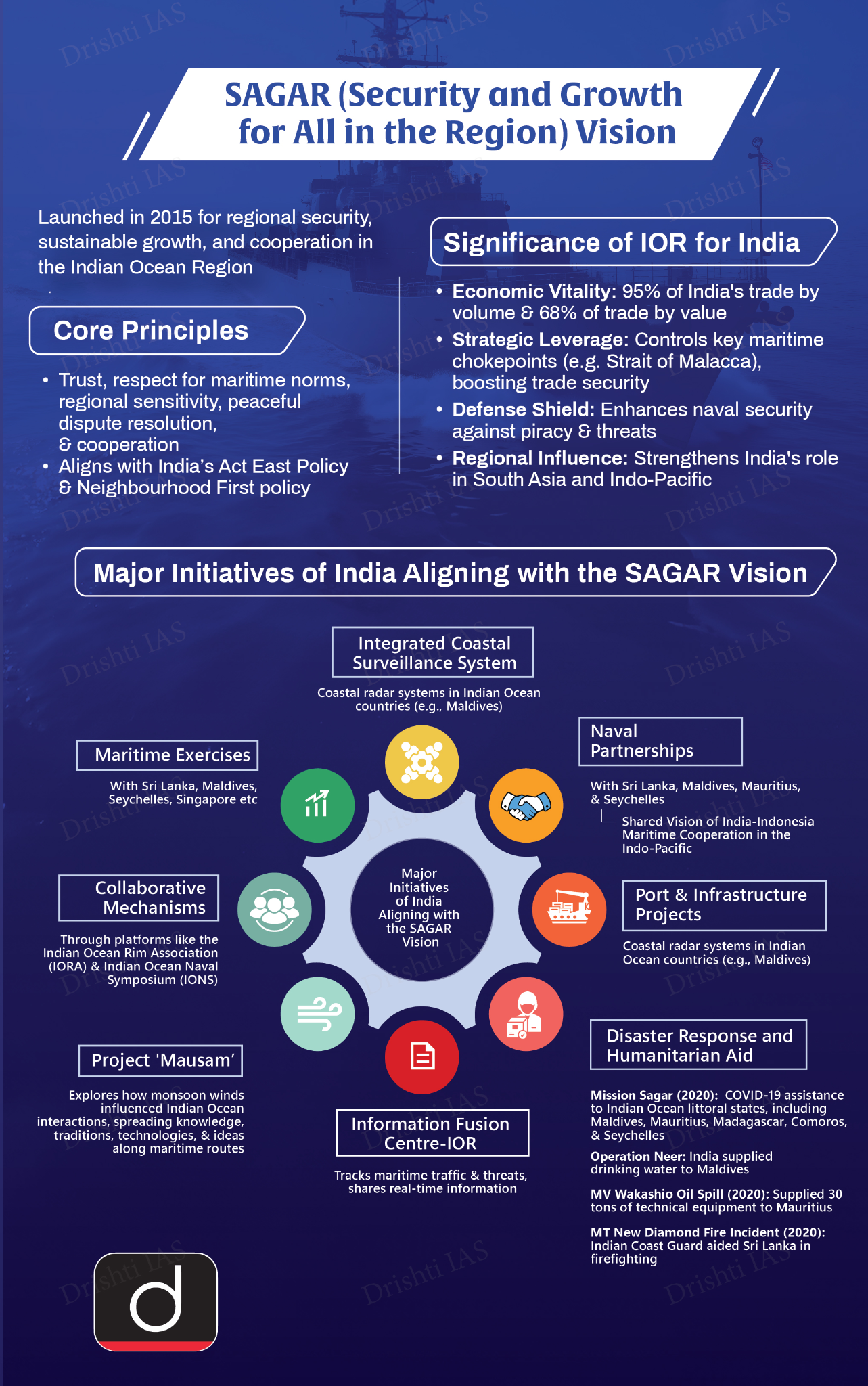International Relations
Route for IORA Under India’s Chairship
- 25 Mar 2025
- 8 min read
For Prelims: Indian Ocean Rim Association (IORA), Indian Ocean, terrorism, human trafficking, disaster risk management, maritime security, fisheries management,blue economy, Security and Growth for All in the Region (SAGAR) vision.
For Mains: India’s Role and Contributions in IORA, Role of IORA in Regional Cooperation.
Why in News?
As India gets ready to take over as Indian Ocean Rim Association (IORA) Chair in November 2025 (currently vice chair), it aims to make the organization’s governance more resilient.
- India plans to boost IORA’s budget, enhance data management with technology, and collaborate with institutions to develop maritime courses over the next two years.
What is the Indian Ocean Rim Association (IORA)?
- About: IORA is an intergovernmental organisation established to promote economic cooperation and regional integration among countries bordering the Indian Ocean.
- IORA member states work on various initiatives related to trade, investment, and sustainable development in the Indian Ocean region (IOR).
- Background: It was established on 7th March 1997. The vision for IORA originated during a visit by late President Nelson Mandela of South Africa to India in 1995.
- This idea led to the Indian Ocean Rim Initiative (IORI) in 1995 and the formation of the Indian Ocean Rim Association for Regional Cooperation (IOR-ARC) in 1997, now known as IORA.
- Membership: IORA welcomes all sovereign states along the Indian Ocean Rim that adhere to its Charter’s principles and objectives.
- Currently, it comprises 23 member states and 10 dialogue partners, IORA covers Asia, Africa, and Oceania, connecting nations via the Indian Ocean waters.
Indian Ocean Region
- The IOR forms a unique geopolitical and economic zone within the broader Indo-Pacific region.
- It is home to two-thirds of the world’s population and plays a crucial role in global trade and energy security.
- The Indian Ocean facilitates 75% of global trade and 50% of daily oil consumption, generating USD 1 trillion in goods and services, with intra-IORA trade reaching USD 800 billion in 2023.
What is India’s Role and Strategic Contributions in IORA?
- Alignment with SAGAR Vision: India’s Security and Growth for All in the Region (SAGAR) vision closely aligns with IORA’s strategic objectives, emphasizing maritime security, economic cooperation, and sustainable development.
- Leveraging Diplomatic and Economic Ties: India should capitalize on its strong diplomatic and economic relations with IORA member states to foster long-term, sustainable, and cooperative solutions for regional challenges.
- Enhancing IORA’s Budget: India plans to secure sustainable IORA funding through public-private partnerships, leveraging maritime sectors like shipping, oil, gas, and tourism to boost economic cooperation.
- Integrating Technology: India aims to enhance data governance and policy analysis through digital tools, ensuring transparency, efficiency, and faster decision-making.
- Maritime Capacity Building: India will partner with academic institutions to introduce marine-focused courses, building a skilled workforce to drive innovation and growth in the blue economy.
What is the Role of IORA in the Indian Ocean Region?
- Role in Regional Cooperation: The IORA, recognized as one of the longest-standing regional inter-governmental organizations, plays a pivotal role in fostering multifaceted cooperation among its member states.
- Facilitation of Dialogue: IORA actively facilitates structured dialogue on cultural and academic exchanges, disaster risk management, and maritime security, aiming to strengthen regional resilience and promote sustainable development.
- Influence of Middle and Small Powers: While global powers like the U.S., China, and the EU engage as dialogue partners, IORA is mainly driven by middle and small powers that shape its agenda and decisions.
What are the Challenges Faced by IORA?
- Financial Constraints: IORA faces significant financial constraints (USD 1.3 billion budget for 2020-2025), as its annual budget remains heavily dependent on member-state contributions, which limits its ability to expand operations and implement large-scale initiatives.
- Most IORA members, except Singapore, the UAE, and France, are budget-constrained developing economies, weakening the organization’s financial stability.
- Resource-Intensive Engagement Areas: IORA’s expanding mandate in critical areas such as maritime safety, fisheries management, disaster risk reduction, blue economy, demands sustained financial and institutional resources, posing a challenge to its effective implementation and long-term impact.
- Private Sector Involvement: IORA struggles to attract private sector engagement from key maritime industries like shipping, oil & gas, and tourism.
- Without stronger partnerships, it risks missing out on alternative funding sources, improved operational efficiency, and long-term financial sustainability.
- Limited Institutional Capacity: IORA’s Secretariat in Mauritius operates with a small workforce and constrained resources, which limits its ability to effectively manage administrative and strategic functions.
- Challenges in Data Management: The lack of advanced data management systems results in inefficient record-keeping, increasing the margin of error and hindering accurate policy formulation and decision-making.
Conclusion
Building a skilled maritime workforce requires industry-academia collaboration and specialized courses in key areas. Strengthening partnerships can drive innovation, address challenges, and ensure economic sustainability. As India leads IORA, enhancing regional cooperation and resource mobilization will maximize its impact.
|
Drishti Mains Question: Examine India's strategic role in IORA. How can India leverage investments and traditional knowledge for sustainable regional governance? |
UPSC Civil Services Examination, Previous Year Question (PYQ)
Q. With reference to ‘Indian Ocean Rim Association for Regional Cooperation (IOR-ARC), consider the following statements: (2015)
- It was established very recently in response to incidents of piracy and accidents of oil spills.
- It is an alliance meant for maritime security only.
Which of the statements given above is/ are correct?
(a) 1 only
(b) 2 only
(c) Both 1 and 2
(d) Neither 1 nor 2
Ans: (d)





